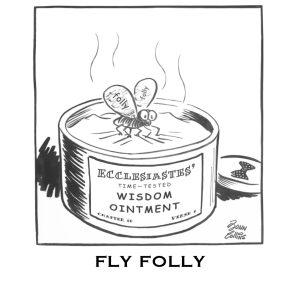How often has the following tragic scenario been played out on the pages of human history: A young man grows up in a Christian home, attends church, lives a clean life, has a good reputation, and when he turns 18 years old he runs off one night to the wrong place, with the wrong friends, and finds himself in a wrong situation in which one foolish decision leads to a lifetime of regret.
Somebody once said that “a small leak will sink a great ship.” I think the Bible says it better. Ecclesiastes 10:1 says, “Dead flies cause the ointment of the apothecary to send forth a stinking savour: so doth a little folly him that is in reputation for wisdom and honour.” Just as a small leak can sink a great ship, so can a little folly sink a good reputation.
 In ancient times, an apothecary was a dealer of spices and perfumes. An apothecary understood the importance of keeping his spices and perfumed ointments covered at all times, otherwise, they would quickly be covered in flies. Just as we keep flies off our food today, so the apothecary tried his best to keep flies out of his ointment so as to keep it from being spoiled. Ecclesiastes 10:1 describes how a little, insignificant fly can spoil precious ointment by causing a great stench.
In ancient times, an apothecary was a dealer of spices and perfumes. An apothecary understood the importance of keeping his spices and perfumed ointments covered at all times, otherwise, they would quickly be covered in flies. Just as we keep flies off our food today, so the apothecary tried his best to keep flies out of his ointment so as to keep it from being spoiled. Ecclesiastes 10:1 describes how a little, insignificant fly can spoil precious ointment by causing a great stench.
The application is so relevant to you and I. Just as a little fly in ointment causes a great stench, so a little folly in the life of a person mars a good reputation. A testimony can take a lifetime to build. But it takes one moment of fleshly gratification to spoil it. One’s life, one’s testimony, one’s reputation can be spoiled through one act of fleshly indulgence.
The Bible commands us to be “sober…vigilant” because we have an adversary who is seeking to destroy us! If you are a believer in Christ, know Satan is seeking to destroy your effectiveness and testimony for Christ. The Bible says “a little leaven leaveneth the whole lump.” A little compromise, a little inconsistency, a little sin, a little idleness, a little folly can lead to a great “spiritual shipwreck.”
We all come to crossroads in our life from time to time where we are faced with two pathways before us: the pathway of sin and compromise or the pathway of righteousness and godliness. Down one path lies the momentary pleasures of sin for a season, followed by a lifetime of regret and a reputation ruined. Down the other path lies self-denial, mortification of the flesh, abstaining from sin and all appearance of evil, but everlasting joy to follow.
A little folly can cause a great stink in one’s life. It can cause a man with a reputation for wisdom and honor to live the rest of his days with regret. Thankfully, there is forgiveness in Christ for any sin that we commit. But there is no getting back a lost reputation and testimony for Christ. We must be wise and upright in every decision we make. We must not allow any form of folly or sin into our lives.
“Nothing darkens the eyes of the mind so much, and deadens the conscience so surely, as an allowed sin. It may be a little one, but it is not the less dangerous for all that. A small leak will sink a great ship, and a small spark will kindle a great fire, and a little allowed sin in like manner will ruin an immortal soul. Take my advice, and never spare a little sin.” (J.C. Ryle)
~Pastor Aaron Francis



 Think of the worldwide flood in Genesis or the many local floods throughout human history. Uncontrolled water has been the cause of some of the world’s greatest disasters. On September 30, 1911, a dam in Austin, Pennsylvania failed when the water pressure caused it to crack and spill out a torrent of water which flooded most of the town, costing $140 million (2010 USD) in damages, and resulting in the death of 78 people. A small leak led to a great flood with great damage in a short time. The Bible reminds us that our words can be the same way when we allow a little bit of strife to remain unchecked. A little strife in a marriage can cause a flood of hurt. A little strife in a home can lead to a lack of peace and joy. A little strife in a church can lead to broken friendships and loss of God’s blessing.
Think of the worldwide flood in Genesis or the many local floods throughout human history. Uncontrolled water has been the cause of some of the world’s greatest disasters. On September 30, 1911, a dam in Austin, Pennsylvania failed when the water pressure caused it to crack and spill out a torrent of water which flooded most of the town, costing $140 million (2010 USD) in damages, and resulting in the death of 78 people. A small leak led to a great flood with great damage in a short time. The Bible reminds us that our words can be the same way when we allow a little bit of strife to remain unchecked. A little strife in a marriage can cause a flood of hurt. A little strife in a home can lead to a lack of peace and joy. A little strife in a church can lead to broken friendships and loss of God’s blessing.


 In Job 4-5, Eliphaz was the first of Job’s “friends” to respond to his suffering. In Job 6:2, Job answered Eliphaz and said, “Oh that my grief were thoroughly weighed, and my calamity laid in the balances together”. In other words, Job responded by telling Eliphaz that his well-intentioned words had only made his suffering worse. Eliphaz made a wrong analysis of Job’s situation and spoke words that only hurt Job more. The words of Eliphaz were weak and flavorless like unsalted food or the tasteless white of an egg (v. 6). Eliphaz’s words did not bring strength or health to Job, rather, they were harsh and undeserved. Job told Eliphaz that his words lacked pity towards his suffering (v. 14) and were as unreliable as a snow-fed stream that disappears when the temperature rises (vv. 15-17). Job’s reaction climaxes in v. 21- “For now ye are nothing…” Job’s friends tried to offer help but were unreliable, unhelpful, and aggravating. Job felt as though he couldn’t trust the words of his friends.
In Job 4-5, Eliphaz was the first of Job’s “friends” to respond to his suffering. In Job 6:2, Job answered Eliphaz and said, “Oh that my grief were thoroughly weighed, and my calamity laid in the balances together”. In other words, Job responded by telling Eliphaz that his well-intentioned words had only made his suffering worse. Eliphaz made a wrong analysis of Job’s situation and spoke words that only hurt Job more. The words of Eliphaz were weak and flavorless like unsalted food or the tasteless white of an egg (v. 6). Eliphaz’s words did not bring strength or health to Job, rather, they were harsh and undeserved. Job told Eliphaz that his words lacked pity towards his suffering (v. 14) and were as unreliable as a snow-fed stream that disappears when the temperature rises (vv. 15-17). Job’s reaction climaxes in v. 21- “For now ye are nothing…” Job’s friends tried to offer help but were unreliable, unhelpful, and aggravating. Job felt as though he couldn’t trust the words of his friends.
